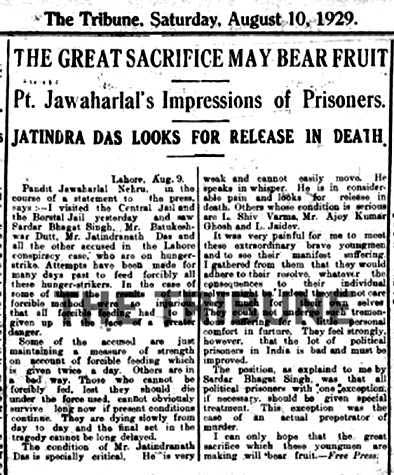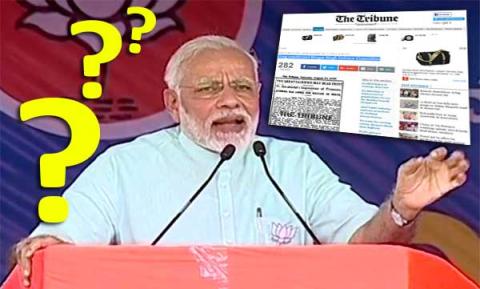कर्नाटक में चुनावी भाषण के दौरान नरेन्द्र मोदी द्वारा भगत सिंह पर दिये गए बयान की खूब खिल्ली उड़ रही है। मोदी ने कहा था कि जैसा मुझे पता है, जब भगत सिंह और उनके साथी जेल में बंद थे तो कांग्रेस परिवार का कोई व्यीक्ति उनसे मिलने तक नहीं गया। मोदी ने साथ ही कहा कि अगर उनके बयान में कोई त्रूटि है तो कोई भी आकर उसमें सुधार करे। इसी कथन पर देश भर के बुद्धिजीवियों में बहस छिड़ी। और अधिकांश लोग मोदी के इतिहास ज्ञान पर सवाल उठाने लगे। और अब तो उस जमाने के ख्यातिप्राप्त अखबार द ट्रिब्युन ने भी रिपोर्ट छापकर और तब केे अखबारी कतरन प्रकाशित करके स्पष्ट किया है कि न केवल जवाहरलाल नेहरू जेल में बंद भगत सिंह व अन्य क्रांतिकारियों से मिले बल्कि उनकी रिहाई के लिए एक कमिटी भी कांग्रेस की ओर से गठित की गई थी। पूरी जानकारी पढि़ये द ट्रिब्युन की इस रिपोर्ट में:
Cong constituted Bhagat Singh Defence Committee
Chandigarh, May 12 (Tribune News Service): The Congress was at the forefront of the campaign to defend Bhagat Singh and his comrades and the Bhagat Singh Defence Committee to provide legal and financial aid to the revolutionaries was set up on the initiative of Congress leaders in Punjab, show reports in The Tribune archives.
Prime Minister Narendra Modi had at a rally in Bidar, Karnataka, sought to know from the people if any Congress leader had visited the revolutionaries in prison. The Tribune, quoted from its archives to set the record straight. The paper had covered the trial in the Lahore conspiracy case, standing by the revolutionaries.

As per a news report published in The Tribune on November 16, 1929, Dr Satyapal, Dr Gopi Chand, Dr Kitchlew, Sardar Singh, Raizada Hans Raj, Pt K Santanam, Mangal Singh, Lajwantti, Master Tara Singh and Lala Feroze Chand were members of the Bhagat Singh Defence Committee, most of them from Punjab. In a touching appeal, also published in The Tribune, to the public for funds, the committee said: “The flower of our youth has been flung into jails and is rotting there with very inadequate help from the outside.”
Another report appearing on August 9, 1929, says that Nehru, accompanied by Congress leader Dr Gopi Chand (MLC), visited the Lahore central and Borstal jails on August 8 and interviewed those on a protest fast.
Nehru issued a statement titled ‘The Great Sacrifice May Bear Fruit’ which appeared in The Tribune on August 10, 1929, in which he criticised the jail authorities for trying to force feed Bhagat Singh and his comrades.
“It was very painful for me to meet these extraordinary brave young men and to see their manifest suffering. I gathered from them that they would adhere to their resolve, whatever the consequences to their individual selves might be... I can only hope that the great sacrifice which these young men are making will bear fruit.”
Nehru also recollected his meeting with Bhagat Singh and his comrades in his autobiography. His father, Motilal Nehru, provided financial help and sent messages in support of the revolutionaries while on his deathbed.
Historian Aparna Vaidik, an expert on the revolutionary movement in India’s freedom struggle, says that when the body of revolutionary Jatin Das was taken to Calcutta (now Kolkata) by train, Pandit Nehru was at the Kanpur railway station to pay homage to the departed revolutionary. “Nehru’s eyed welled up when he touched the martyr’s body,” she says, quoting The Tribune dated September 17, 1929.
Prof Chaman Lal, a former professor with Jawaharlal Nehru University (JNU), known for his work on Bhagat Singh, remarked: “The Tribune reports hold ample testimony to the role played by Congress leaders during the trial of Bhagat Singh and his comrades.”
- FactFold with contribution of MY Siddiqui

